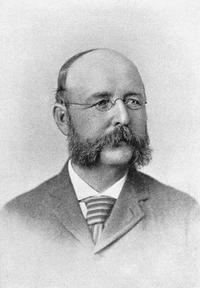John Knowles Paine

John Knowles Paine (January 9, 1839 – April 25, 1906), was the first American-born composer to achieve fame for his large-scale orchestral music.
Life
He studied organ, orchestration, and composition in Germany and toured in Europe for three years. After returning to the US and settling in Boston in 1861, he became a member of the faculty of Harvard, a post that he retained for many years. He was one of the dominant musical figures on the musical scene in Boston and together with a group of other composers collectively known as the Boston Six, Paine was one of those responsible for the first significant body of concert music by composers from the United States. The other five were George Chadwick, Horatio Parker, Arthur Foote, Edward MacDowell, and Amy Beach.
The Grove Music Encyclopedia says of him:
- ”… Paine served the Harvard community for 43 years. By his presence and by his serious concern with music in a liberal arts college he awakened a regard for music among many generations of Harvard men. His writings testify to his insistence upon the place of music within the liberal arts…” [1]
Notes and References
- ^ "John Knowles Paine". Grove Music Online. Oxford University Press. ISSN 00318299.
Principal Works
Opera
- Azara
Orchestral
- Symphony #1 in C minor op. 23
- As You Like It, Overture, op. 28
- The Tempest, Symphonic Poem op. 31
- Symphony #2 in A Major "In Spring" op. 34
- Prelude from Oedipus Tyrannus op. 35
Chorus and Orchestra
- Mass in D
- St. Peter: An Oratorio op. 20
Organ
- Concert Variations on the "Star Spangled Banner", [Opus 1] - 1861
- Concert Variations on the Austrian Hymn op. 3 #1
- Fantasy uber "Ein' feste Burg" op. 13
- Prelude in B minor op. 19 #2
- Fugue in C minor (from Four Pieces) op. 36
See also
External links
- Template:WIMA
- Free scores by John Knowles Paine at the International Music Score Library Project (IMSLP)
- Free scores by John Knowles Paine in the Choral Public Domain Library (ChoralWiki)
